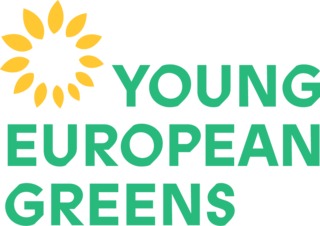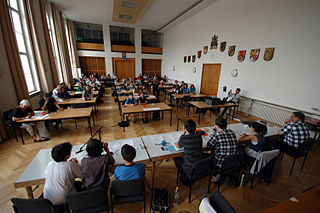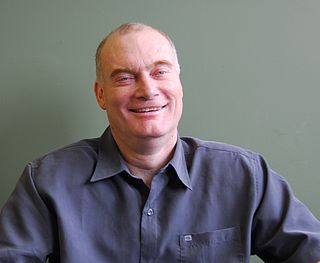
The Paralympic Games or Paralympics, also known as the Games of the Paralympiad, is a periodic series of international multisport events involving athletes with a range of disabilities. There are Winter and Summer Paralympic Games, which since the 1988 Summer Olympics in Seoul, South Korea, are held almost immediately following the respective Olympic Games. All Paralympic Games are governed by the International Paralympic Committee (IPC).

Accessibility is the design of products, devices, services, vehicles, or environments so as to be usable by people with disabilities. The concept of accessible design and practice of accessible development ensures both "direct access" and "indirect access" meaning compatibility with a person's assistive technology.

The Federation of Young European Greens, often referred to as FYEG, is an umbrella organisation that gathers young green movements and organisations across Europe with 40,000 members. FYEG's aim is to defend climate and social justice on the European level. Since 2007, FYEG is the European Green Party's youth wing.
Disabled Peoples' International (DPI) is a cross disability, consumer controlled international non-governmental organization (INGO) headquartered in Ottawa, Ontario, Canada, and with regional offices in Asia-Pacific, the Middle East, Europe, Africa, Latin America, and North America and the Caribbean. DPI is a network of national organizations or assemblies of disabled people, established in 1980–81 to promote the human rights of disabled people through full participation, equalization of opportunity and development. DPI assists organisations in over 152 nations with the day to day issues of helping disabled people. They also host assemblies and symposiums across the world with their different national branches.

The European Youth Forum is an international non-profit association that serves as an umbrella organisation and advocacy group of the national youth councils and international non-governmental youth organisations in Europe. It works on youth rights in international institutions such as the European Union, the Council of Europe, and the United Nations.
The International Disability Alliance (IDA), created in 1999, is an umbrella organization focused on improving awareness and rights for individuals with disabilities around the globe. The IDA works with Non Governmental Organizations (NGO's), supranational organizations such as the United Nations (UN), as well as state governments in order to create legislation, fund disability programs in developing and industrialized countries, and advocate for people with disabilities around the world. The IDA works very closely with the United Nations, and in particular they use the United Nations Convention on the Rights of Persons with Disabilities (UNCRPD) as their code of conduct.

The Paralympic sports comprise all the sports contested in the Summer and Winter Paralympic Games. As of 2020, the Summer Paralympics included 22 sports and 539 medal events, and the Winter Paralympics include 5 sports and disciplines and about 80 events. The number and kinds of events may change from one Paralympic Games to another.

Youth councils or parliaments, are a form of youth voice engaged in community decision-making. Youth councils are appointed bodies that exist on local, state, provincial, regional, national, and international levels among governments, non governmental organisations (NGOs), schools, and other entities. Groups that include children often call themselves children's parliaments and are paired with youth parliaments of older kids.

Dr. Gary Birch, is a Canadian Paralympian, an expert in brain–computer interface (BCI) technology and executive director of the Neil Squire Society. In 1975, Dr. Birch was involved in an automobile accident which resulted in injuries to the C6 and C7 area of his spine making him a low-level quadriplegic. He was one of the original players of Murderball, and won several medals in the 1980 Summer Paralympics in the Netherlands. In 2008, he was appointed an Officer of the Order of Canada. He continues to champion accessibility through his Research and Development work in assistive technologies at the University of British Columbia, the Rick Hansen Institute, and the Neil Squire Society.
The FIMCAP, which is short for Fédération Internationale des Mouvements Catholiques d’Action Paroissiale, is an umbrella organization for Catholic youth organizations. Its 31 member organizations are based in 28 countries. The FIMCAP was founded in 1962 and is recognised as an official Catholic organization by the Dicastery for Laity, Family and Life. FIMCAP is also a full member of the European Youth Forum.

European Sports NGO Youth is the non-governmental umbrella youth organisation of ENGSO. It has the aim to represent the young Europeans in sports in 34 countries and to achieve, promote and support the implementation of the ENGSO guidelines for children and youth sport. ENGSO Youth promotes health, sustainable development, sport diplomacy, education and employability, and inclusion through sports. ENGSO Youth is member of the European Youth Forum since 2007.

Dan Christian Ghattas is an intersex activist, university lecturer and author who co-founded OII Europe in 2012 and is now executive director. In 2013, he authored Human Rights between the Sexes, a first comparative international analysis of the human rights situation of intersex people.

People with disabilities in Pakistan are seen differently than in most Western countries due to cultural and religious beliefs. The lack of accurate epidemiological evidence on disabilities, insufficient resources, weak health care facilities and worker shortages are major obstacles to meeting the needs of disabled Pakistanis.

Intersex people are born with sex characteristics that "do not fit the typical definitions for male or female bodies". They are substantially more likely to identify as lesbian, gay, bisexual, or transgender (LGBT) than the non-intersex population, with an estimated 52% identifying as non-heterosexual and 8.5% to 20% experiencing gender dysphoria. Although many intersex people are heterosexual and cisgender, this overlap and "shared experiences of harm arising from dominant societal sex and gender norms" has led to intersex people often being included under the LGBT umbrella, with the acronym sometimes expanded to LGBTI. Some intersex activists and organisations have criticised this inclusion as distracting from intersex-specific issues such as involuntary medical interventions.

The Advisory Council on Youth is a non-governmental youth constituency of the Council of Europe. It is a crucial part of the unique co-management structure, a living example of participatory democracy, where young Europeans together with the European Steering Committee for Youth (CDEJ), the body of the representatives of Youth ministries from the 50 States Parties to the European Cultural Convention, equally decide on the standards and work priorities of the Council of Europe's youth sector in the Joint Council on Youth (CMJ).
Deafness in Ghana carries with it a large social stigma. Deafness in Ghana is also a variegated subject, in large part due to government policies, or a lack thereof. Deaf Ghanaians choose from a number of sign languages, with the primary one estimated to be Ghanaian Sign Language. The exact number of deaf individuals in Ghana is not known for sure, but It is estimated that there are between 110,000 and 211,000 deaf and hard of hearing people in Ghana. Deaf awareness in Ghana has been on the rise since the arrival of the educator Andrew Foster from America in 1957. There are over a dozen schools teaching deaf Ghanaians, and a number of organizations advocating on behalf of Ghana's deaf population.
Japanese Sign Language (JSL), also known as Nihon Shuwa, is the unofficial but most predominantly used sign language used by nearly 57,000 native signers as their primary language. It is a convergent, Deaf community sign language developed in the late 19th century.
Deafness in Poland is a topic relevant to education and communities. Poland has a history with DHH people, dating back to 1817. About 15.1% of Polish people in Poland say they have hearing loss. PJM is the main signed language in Poland.

Italy is a country located in the south of Europe. The capital city is Rome. There are about 59 million people in Italy, and about 3.5 million Italians have some form of hearing loss. Among them, around 70,000 people are severely deaf. The European Union for the Deaf reports that the majority of the deaf people in Italy use Italian Sign language (LIS). LIS has been an official sign language in Italy since 2021. Italy, among other countries, ratified the Convention on the Rights of Persons with Disabilities (CRPD) and is slowly improving conditions for deaf humans in Italy. Many major organizations in Italy fight for deaf rights and spread awareness to the Italian National Agency for the protection and assistance of the Deaf and Associated Italian Families for the Defense of the Rights of Deaf and Hard of Hearing Individuals (FIADDA). Newborns in Italy also receive universal hearing screenings. Education in Italy is directed towards oralism although sign language is also used. LIS is a stable language and used by 10,000 to 1,000,000,000 users in Italy.
The Singapore Association for the Deaf (SADeaf) is a charitable organisation for the deaf and hard-of-hearing in Singapore founded in 1955. SADeaf is a member of the National Council of Social Service and the World Federation of the Deaf. SADeaf is also supported by the Ministry of Education and the Ministry of Social and Family Development.










